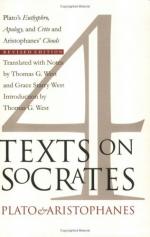
|
| Name: _________________________ | Period: ___________________ |
This test consists of 5 multiple choice questions, 5 short answer questions, and 10 short essay questions.
Multiple Choice Questions
1. What does Socrates say about death and the divine voice in his head?
(a) His divine voice has assured him he will be with Zeus in heaven.
(b) If death was a bad thing, his divine voice would have objected to his trial.
(c) His divine voice has told him terrible things about the afterlife.
(d) His divine voice will die with him, and that is truly a tragedy.
2. What is the subject of Plato's Apology?
(a) Socrates' trial.
(b) Socrates' definition of piety.
(c) A day of Socrates teaching at his school.
(d) Socrates' execution.
3. What is Socrates' first defense against the charge that he is corrupting youth?
(a) He has no hand in making laws, which is what truly corrupts youth.
(b) If love is a crime, Socrates is guilty as charged.
(c) Youth is made for corruption; only later in life does one find morality.
(d) He had only talked with elderly people at his school.
4. What nationality was Socrates?
(a) Roman.
(b) Persian.
(c) Italian.
(d) Greek.
5. Why didn't Socrates bring his family to court?
(a) He did not want to look at his children and cry.
(b) He thought the jury would hate him for the gesture.
(c) He did not want to garner pity.
(d) He did not want to pay for the extra lodging costs.
Short Answer Questions
1. How should one seeking meaning in life, according to Socrates?
2. What topic does Socrates discuss to dismantle Euthyphro's initial definition of piety?
3. Why is Socrates wiser than anyone he knows?
4. What does Socrates claim about his relationship with his students?
5. What is the "good life" as defined by Athens law, according to Plato's Apology?
Short Essay Questions
1. According to Socrates, why didn't he ever pursue politics?
2. Who are the characters of Euthyphro? What is the setting?
3. What is Socrates' counter to the second definition of piety offered in Euthyphro?
4. What is Socrates' initial reaction to the first definition of piety provided in Euthyphro?
5. How does Socrates relate human goodness to the first definition of piety provided in Euthyphro?
6. What is Socrates' response to the charge that he is impious and/or an atheist?
7. Why is Socrates charged with corrupting the youth? Why do the youth follow his philosophy and ideas?
8. What is Socrates' second response to the charge that he has corrupted Athens' youth?
9. What is the general attitude held by the citizens of Athens toward the characters of Euthyphro?
10. Describe Socrates' account of his encounter with the oracle at Delphi and how it relates to his status as a wise man.
|
This section contains 973 words (approx. 4 pages at 300 words per page) |

|




